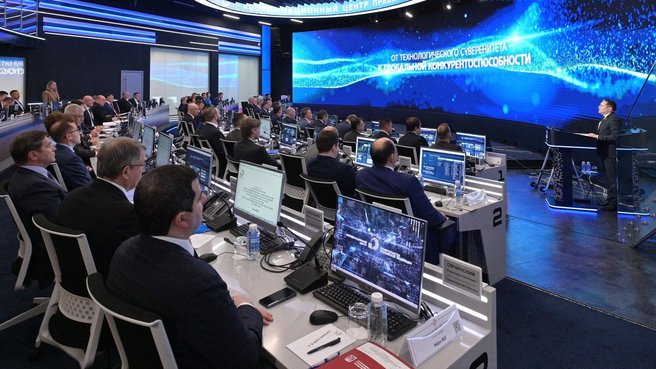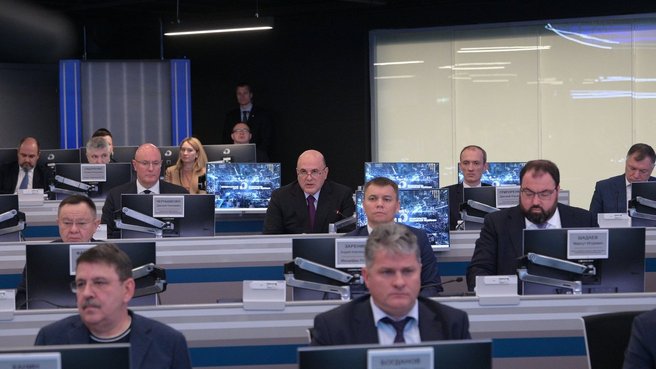Mikhail Mishustin: “The purpose of the external sanctions among other things was to stop production processes in the country. But that did not happen, including due to the fact that many foreign products already had domestic analogues. We began customising them to meet enterprises’ specific needs.”
Mikhail Mishustin’s opening remarks:
Mikhail Mishustin holds strategic session on transitioning industry to a domestic digital system for full-cycle product support
Good afternoon, colleagues,
The President has set a task: to reduce our dependency on foreign software.
To achieve that, we are updating the current strategic focuses of the digital transformation of key sectors and adopting new ones.
Two weeks ago, we had an in-depth discussion of the launch of large technological sovereignty projects at the strategic session: the so-called megaprojects. Each one has at least 10 billion roubles of investments. Their implementation will make it possible to create a range of heavily localised innovative products demanded by our economy and social sectors.
Reliable and up-to-date software is a very important component of advanced and efficient production. Previously, this niche was mainly occupied by foreign corporations. And of course, we need to talk honestly and openly about our industry. In industry, foreign solutions were almost universally the foundation of many design tools and technological software systems. And every year the profit of Western developers and suppliers on the Russian market exceeded 35 billion roubles.
The purpose of the external sanctions among other things was to stop production processes in the country. But that did not happen, including due to the fact that many foreign products already had domestic analogues. We began customising them to meet enterprises’ specific needs. And last year, we created special competence centres, which are headed by top managers of leading companies in a variety of fields, including 34 industrial ones and 13 for the development of general system and application software. The heads of digital transformation at federal ministries are responsible for the work of these centres.
The main areas are the automotive industry, electric power industry, oil and gas sector, aviation and rail transport, logistics, chemical industry, and mobile communications.
Designers, managers, representatives of the business community and the government work together to ensure that enterprises have a popular and convenient software product.
About 200 especially significant projects with a total funding of over 230 billion roubles have already been selected. The bulk of the funding is private investment. The amount of grants from the budget will exceed 25 billion roubles.
Russia should become one of the leading countries with its own software products in all classes.
One part of this ambitious challenge is to create solutions to support the full lifecycle of products that are necessary for developing industrial production. Experts estimate the size of this market at almost 56 billion roubles.
Systems of this class are used at more than 88,000 enterprises. Moreover, almost half of them already use domestically produced components. Some have already implemented Russian platforms.
A number of industrial leaders are now actively working on individual elements of “heavy-class” industrial software. Industrial competence centres are developing about 40 such projects with total funding of over 40 billion roubles.
What else would I like to draw your attention to?
There remain gaps in our IT landscape when it comes to some solutions. These are still empty niches. For example, there is demand for design programmes for microelectronics, photonics, and automated quality control.
In general, it is necessary to unite the efforts of industrialists and designers to create domestic systems to support the full lifecycle of products. To increase cooperation in major projects – be it the manufacturing of a new aircraft, ship or production car, while at the same time maintaining the market and healthy competition.
The introduction of advanced products also requires changes in technological and business processes.
At the national level, it is necessary to agree on unified rules and formats for data exchange, including the approval of new standards. We need an integration service for all Russian developments, which will simplify the interaction between different platforms.
Colleagues, we should clearly define where the focus should be in developing support systems for the full lifecycle of products. Given the consolidation of efforts of private business, enterprises in economic sectors and all key software manufacturers.
We already have significant potential. There are competitive domestic geometric kernels that are needed to create and manage complex two- and three-dimensional models. By the way, there are only seven of them in the world, and three of them are Russian.
There are fairly mature systems to support manufacturing, engineering simulations, computer-aided design, and other components. They all should continue advancing. Moreover, it is important to ensure the functional compatibility of these products, actively introduce advanced technologies, including artificial intelligence, and encourage new platform and cloud products.
And of course, these actions should be synchronised under the national project Data Economy which is in the works.














